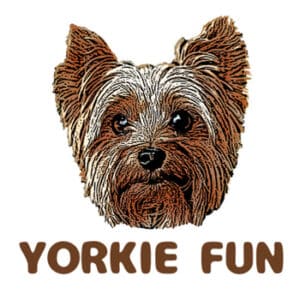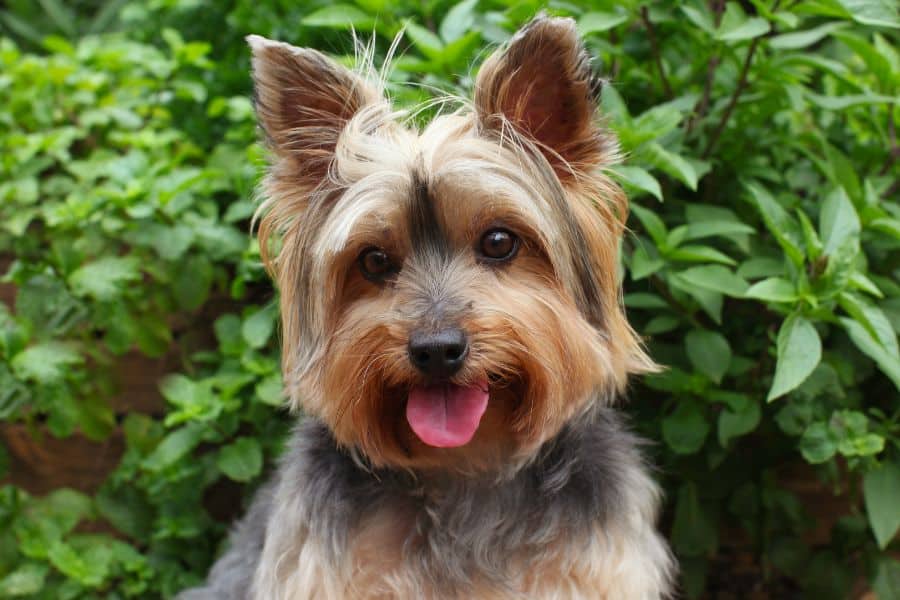Yorkie breeds are a fascinating dog breed originating from Yorkshire, England. The American Kennel Club sets the breed standard for Yorkies, which outlines the breed’s ideal physical and temperamental characteristics. These dogs are known for their small size, weighing only 4 to 7 pounds on average, and their long, silky coats that require regular grooming. Despite their small size, Yorkies are energetic and playful dogs that make great companions for families and individuals alike.
Yorkie breeds have a unique history that dates back to the mid-19th century when they were bred as working-class dogs in Yorkshire’s textile mills. They were used to catch rats and other vermin that infested these mills. Over time, these dogs became popular among wealthy families who appreciated their charming personalities and adorable looks.
The breed standard set by the American Kennel Club describes Yorkies as having a compact body with a level backline and straight legs. Their head is small with V-shaped ears that stand erect. They have dark eyes with intelligent expression, and their coat is long, silky, and glossy.
One of the most distinctive features of Yorkie breeds is their temperament. They are known to be confident, brave, and loyal dogs who love attention from their owners. They can be quite stubborn at times but respond well to positive reinforcement training methods.
If you’re considering getting a Yorkie breed as your next pet or companion animal, it’s important to understand some basic facts about them before deciding. For example, because they are such small dogs, they may not be suitable for households with young children who could accidentally harm them during playtime.
Because of their long coats that require regular grooming sessions to maintain their lustrous appearance, they may not be suitable for people who don’t have enough time or resources to devote to this purpose.
Yorkshire Terrier Breed Facts
Origins and Appearance
Hailing from Yorkshire, England, the Yorkshire Terrier breed was developed in the 19th century to catch rats in clothing mills. These small dogs weigh between 4-7 pounds on average and stand at around 8-9 inches tall. They have a long, silky coat that comes in various shades of blue and tan. Regular grooming is necessary to maintain their beautiful coat.
Personality Traits
Yorkshire Terriers are known for their feisty and confident personalities. Despite their small size, they are not afraid to assert themselves when needed. They make excellent watchdogs due to their alertness and tendency to bark at any perceived threat. However, with proper training and socialization, they can also be affectionate and loyal companions.
Have you ever wondered who the loudest terrier is? Is it a Yorkie? Find out in this article where we compare how loud different terriers are.
Distinct Characteristics
Scottish Terriers are often mistaken for Yorkshire Terriers due to their similar appearance, but they are a separate breed with distinct characteristics. Scottish Terriers have a wiry coat, while Yorkshire Terriers have a silky one. Scottish Terriers tend to be more reserved than Yorkies.
Popularity as Companion Dogs
Yorkshire Terriers have become increasingly popular as companion dogs over the years due to their small size and charming personalities. They are adaptable dogs that thrive in urban apartments and rural homes with large yards. Their compact size also makes them great travel companions.
Famous Yorkies
Yorkshire Terriers have been featured in numerous movies and TV shows throughout history due to their adorable appearance and charismatic personalities. One of the most famous Yorkies is Toto from “The Wizard of Oz.” Other notable Yorkies include Smoky (a war hero who served during World War II), Audrey Hepburn’s beloved pet Mr. Famous, and Elvis Presley’s dog Sweet Pea.
Types of Yorkie Breeds: A Quick Overview
Standard Yorkies: The Largest of the Breed
The standard Yorkie might be perfect for you if you are looking for a Yorkie breed that is not too small or too big. This type of Yorkie breed is the largest and can weigh up to 7 pounds. Standard Yorkies have a lifespan of around 12-15 years and are known for their loyalty and affectionate nature.
One thing to remember when considering a standard Yorkie is that they require regular exercise to stay healthy. They also need a balanced diet and proper grooming to maintain their coat’s shine. However, with proper care, standard Yorkies make excellent pets for families with children.
Toy Yorkies: Small But Mighty
Toy Yorkies are smaller than standard ones and typically weigh between 4 to 6 pounds. Despite their small size, they have big personalities and are known for being energetic, playful, and loving. Toy Yorkies have a lifespan of around 12-15 years.
One thing to note about toy Yorkies is that they can be prone to certain health issues, such as hypoglycemia (low blood sugar), dental problems, and luxating patellas (knee joint dislocation). Therefore, taking them for regular check-ups at the vet is essential.
Teacup Yorkies: The Smallest of Them All
Teacup Yorkies are the smallest type of this breed and can weigh as little as 2 pounds. These tiny pups have become increasingly popular due to their cute looks and portability. Teacup Yorkies have a lifespan of around 12-15 years.
However, there are some things you need to consider before getting a teacup Yorkshire Terrier. Because of their small size, they are fragile creatures that require extra care from their owners. They also tend to be more prone to health issues such as hypoglycemia, liver shunts, and respiratory problems.
Parti Yorkies: The Unique Ones
If you’re looking for a unique-looking Yorkie breed, then the Parti Yorkie might be perfect for you. These dogs have white coats with black or brown patches, giving them an adorable and distinct appearance. Parti Yorkies can weigh between 4 to 7 pounds and have a lifespan of around 12-15 years.
One thing to note about Parti Yorkies is that they are not recognized by the American Kennel Club (AKC) as an official breed. However, this doesn’t make them any less lovable or desirable as pets.
Want to learn more about Parti Yorkies? We wrote an entire article that dives into everything you ever wanted to know about Parti Yorkies. Definitely take a moment to check it out.
The Original Yorkshire Terrier
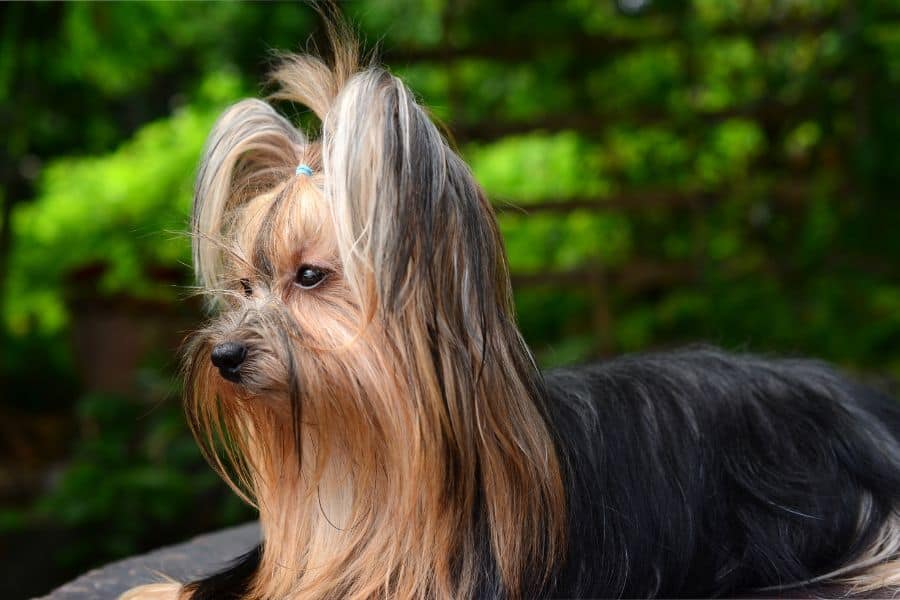
Origins of the Yorkshire Terrier
The breed was named after its place of origin, Yorkshire, which is located in Northern England. In the early days, Yorkies were used for catching rats in mills and factories. They were also used for hunting small animals like foxes and badgers. Due to their small size and agility, they could easily navigate tight spaces to catch their prey.
Yorkshire Terriers, also known as Yorkies, have a fascinating history that dates back to mid-19th century England. Originally bred as ratting dogs, they were developed by crossing various terriers such as the Skye Terrier, Dandie Dinmont and Maltese. This crossbreeding resulted in a small dog with a feisty personality and an excellent hunting ability.
To find out more about where the Yorkie name came from, check out this article that talks about the Yorkie’s origin story.
Evolution of the Yorkshire Terrier
Over time, the purpose of breeding Yorkies shifted from being working dogs to becoming companions. As they became popular pets among wealthy families in England during the Victorian era, breeders focused on enhancing their appearance rather than their working abilities.
One notable change was their fur – originally bred for protection against the cold English climate – which became longer and silkier over time. This new look made them more appealing as lapdogs or show dogs rather than hunters.
Personality Traits of Yorkies
Despite their delicate appearance, Yorkies are known for their confident and feisty personalities. They are loyal companions who love attention from their owners but can be wary of strangers due to their watchdog nature.
Their distinctive bark is another characteristic trait that sets them apart from other breeds. It is loud and high-pitched, which makes them excellent watchdogs but can also make them prone to excessive barking if not trained properly. But don’t worry, we wrote an article about training your Yorkie not to bark.
Grooming Needs of Yorkies
Due to their long fur coat, grooming is an essential part of caring for a Yorkshire Terrier. Their hair requires regular brushing and trimming to prevent matting and tangling. It is also important to keep their ears clean and dry to avoid infections.
Yorkies are sensitive to cold weather, so it is recommended to dress them in warm clothes during the winter months. They also need regular exercise and a balanced diet to maintain their health.
Teacup Yorkies
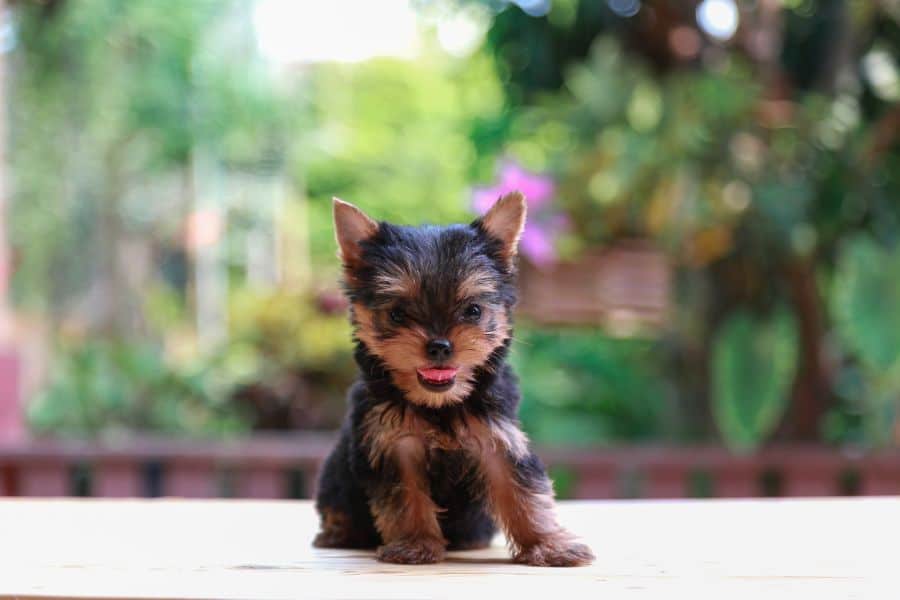
Pet lovers who are looking for a furry friend who is small and easy to take care of might want to consider getting a Teacup Yorkie. These little dogs, also known as Torkies or Toy Yorkies, are bred to be much smaller than the standard Yorkshire Terrier breed. With a weight of 4 pounds or less, they are perfect for those who live in apartments or have limited space.
Loyalty and Affectionate Nature
Despite their small size, Teacup Yorkies make great pets and are known for their loyalty and affectionate nature. They love being around people, especially their owners and thrive on attention. They are also very intelligent dogs that can be trained easily with positive reinforcement techniques.
Health Concerns
It’s important to note that while Teacup Yorkies may be cute and adorable, they do come with some health concerns. Due to their small size, they are more prone to certain health issues such as hypoglycemia (low blood sugar), dental problems, and bone fractures. It’s important to take extra care when handling these little dogs and provide them with proper nutrition and regular check-ups with a veterinarian.
Pet Quality Dogs
Teacup Yorkies are considered pet-quality dogs and unsuitable for breeding or showing due to their small size. While some breeders may advertise “teacup” puppies as rare or special, it’s important to approach this term with caution when purchasing a pup. Major kennel clubs such as the American Kennel Club (AKC) do not recognize the term “teacup” as an official breed variation.
Purchasing Tips
When looking for a Teacup Yorkie puppy, it’s important to find a reputable breeder who prioritizes the puppies’ health over profit. A good breeder will provide you with information about the puppy’s parents, health history, and vaccination records. They will also allow you to visit their facility and meet the puppies in person before making a purchase.
Black Yorkies
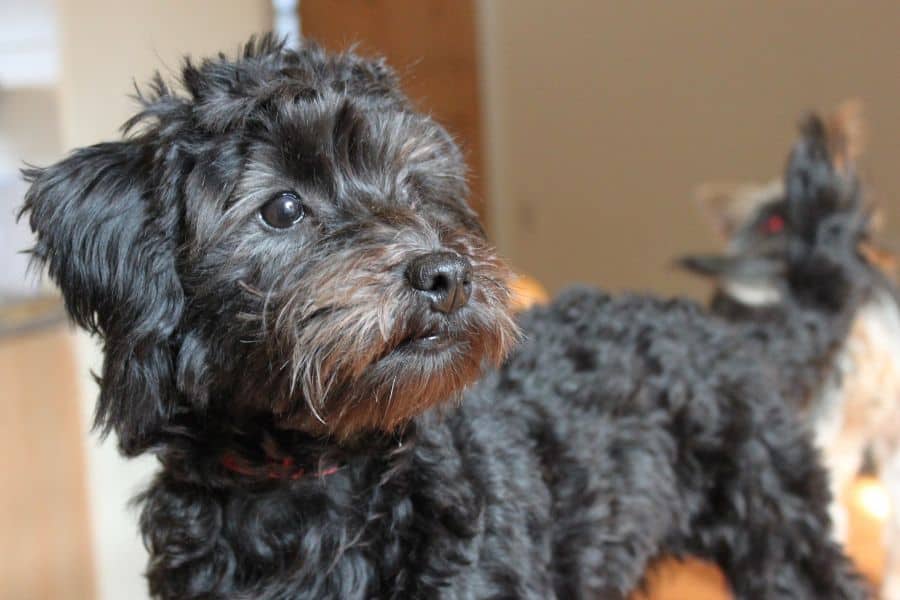
A black coat may not be the first thing that comes to mind when considering a Yorkshire Terrier, but these little pups are a rare and beloved breed variation. While black is not a standard color for Yorkies in dog shows, many owners adore their unique look. In this section, we’ll dive into what makes Black Yorkies so special.
The Genetics Behind Black Yorkies
The black color in Yorkies is caused by a recessive gene that must be inherited from both parents. This means that breeding for black coats can be challenging since both parents must carry the gene for it to show up in their offspring. As a result, Black Yorkies are relatively rare compared to other variations of the breed.
Boston Yorkies: Another Option for Black Coat Lovers
While traditional Yorkshire Terriers can have black coats, Boston Terriers also come in black and white variations. When bred with Yorkies, these pups can create an adorable mix known as Boston Yorkies. These pups often have longer snouts than traditional Yorkies and may weigh slightly more due to their Boston Terrier heritage.
Skin Allergies in Black Yorkies
Unfortunately, Black Yorkies may have a higher risk of skin allergies than other dogs with different coat colors. This is because darker pigments in fur can sometimes cause irritation or inflammation on sensitive skin. If you’re considering adopting a Black Yorkie, it’s important to watch for any signs of skin issues and consult with your veterinarian if necessary.
Size Doesn’t Matter: All About Weight
On average, all variations of Yorkshire Terriers weigh between 4 and 7 pounds regardless of their coat color. So while Black Yorkies may look slightly different than traditional ones due to their coloring, they’re still just as tiny and adorable!
Final Thoughts on Black Yorkies
While they may not fit the traditional mold of a Yorkshire Terrier, Black Yorkies are a unique and beloved variation of the breed. Whether you opt for a traditional Black Yorkie or a mix like a Boston Yorkie, these pups will surely capture your heart with their cute looks and spunky personalities.
Parti Yorkies
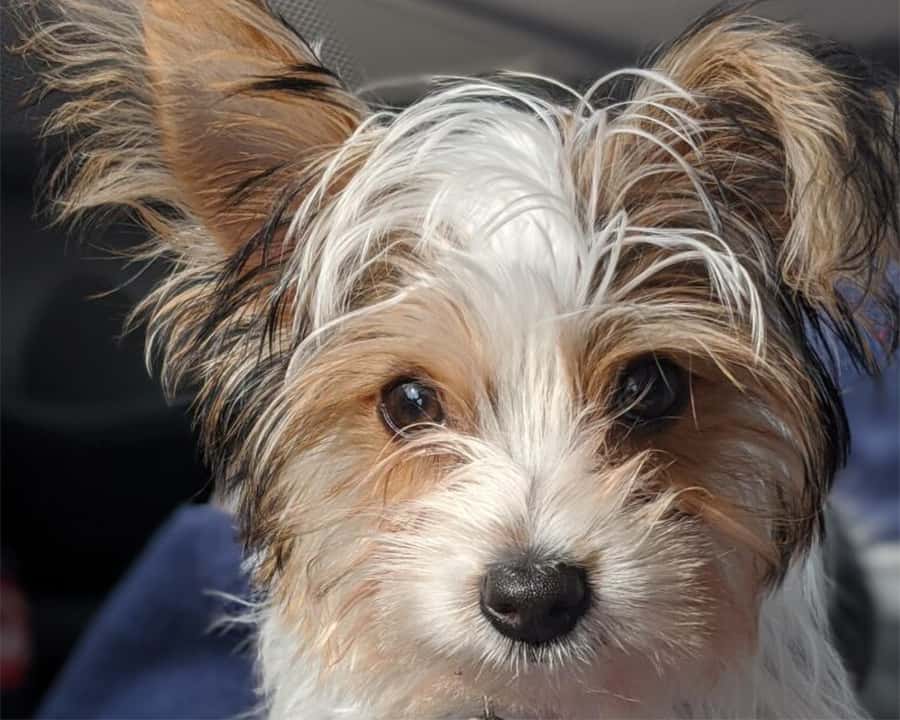
Parti Yorkies are a unique variation of the traditional Yorkshire Terrier breed. They have a distinctive coat pattern that sets them apart from other Yorkie breeds. The American Kennel Club recognizes Parti Yorkies as a distinct breed variation, with specific standards for their appearance and temperament.
Many people find Parti Yorkies fun and playful pets, making them a popular choice for families with children. They are energetic and love to play with their owners or other dogs. Their small size makes them perfect for apartment living or smaller homes.
The coat of Parti Yorkies is usually white with black or brown patches, which can vary in size and shape. Some may also have tan markings on their face, legs, and ears. The color pattern is often unique to each dog, making them even more special to their owners.
Regular Grooming Required
Parti Yorkies require regular grooming due to their long hair, which can be time-consuming for owners. They need daily brushing to prevent the matting and tangling of their hair. Regular trimming of their hair is also necessary to maintain its length and prevent it from becoming too long.
Owners should also regularly clean their ears and teeth to prevent infections or dental problems. Bathing should only be done when necessary, as frequent bathing can strip away natural oils from their skin.
Playful Personality
Parti Yorkies are known for being playful and energetic pets that love attention from their owners. They enjoy playing games like fetch or tug-of-war and going on walks outside.
Their small size makes them easy to carry around, which many owners find convenient when running errands or traveling with them. However, they still require regular exercise like any other dog breed.
Many people appreciate the playful personality of Parti Yorkies as they make great companions for families with children or single individuals looking for a loyal pet.
Biewer Terriers: A New Addition to the Yorkie Family
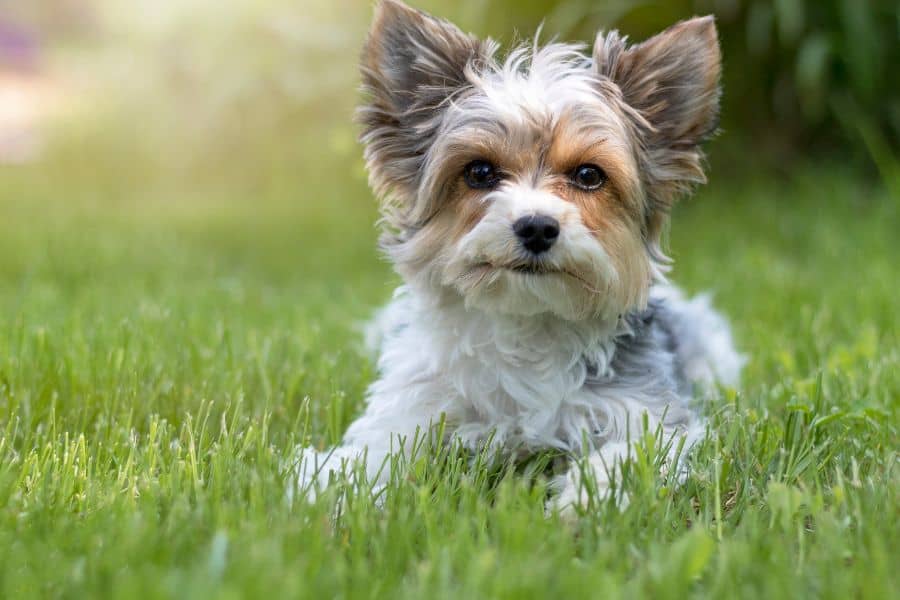
Unique Tri-Colored Coats
Biewer Terriers are a relatively new breed that originated in Germany in the 1980s. They are a type of terrier with a unique tri-colored coat of white, black, and gold. This distinctive coat is what sets them apart from other types of terriers. The Biewer Terrier’s coat is long and silky, which requires regular grooming to keep it looking its best. Despite their small size, these dogs have a big personality and will quickly become the center of attention wherever they go.
Playful and Affectionate Personalities
One thing that sets Biewer Terriers apart from other breeds is their playful and affectionate personalities. These dogs love to be around people and make wonderful companions for families and individuals alike. They are known for being loyal, loving, and always eager to please their owners. If you’re looking for a dog that will be your constant companion, then a Biewer Terrier might be just what you need.
Small Size
Biewer Terriers are small in size, typically weighing between 4 to 8 pounds and standing at around 7 to 11 inches tall. Despite their small stature, they have big personalities that make them stand out from other breeds. They are energetic little dogs that love to play and explore their surroundings. If you live in an apartment or have limited space, then a Biewer Terrier might be the perfect pet for you.
Regular Grooming Required
As mentioned earlier, Biewer Terriers require regular grooming due to their long, silky hair that can easily become tangled and matted if not properly cared for. Regular brushing is essential to prevent matting and tangling of the hair as well as keeping it clean and healthy-looking. It’s important to establish good grooming habits early on so that your Biewer Terrier gets used to the process and doesn’t become stressed or anxious.
Popularity Among Dog Lovers
Despite being a relatively new breed, Biewer Terriers have quickly gained popularity among dog lovers worldwide. Their unique tri-colored coat, playful personality, and small size make them an attractive choice for many people. They are also known for being hypoallergenic, which is a plus for those who suffer from allergies. If you’re looking for a dog that’s both adorable and easy to care for, then a Biewer Terrier might be just what you need.
Designer Yorkies or Mixes
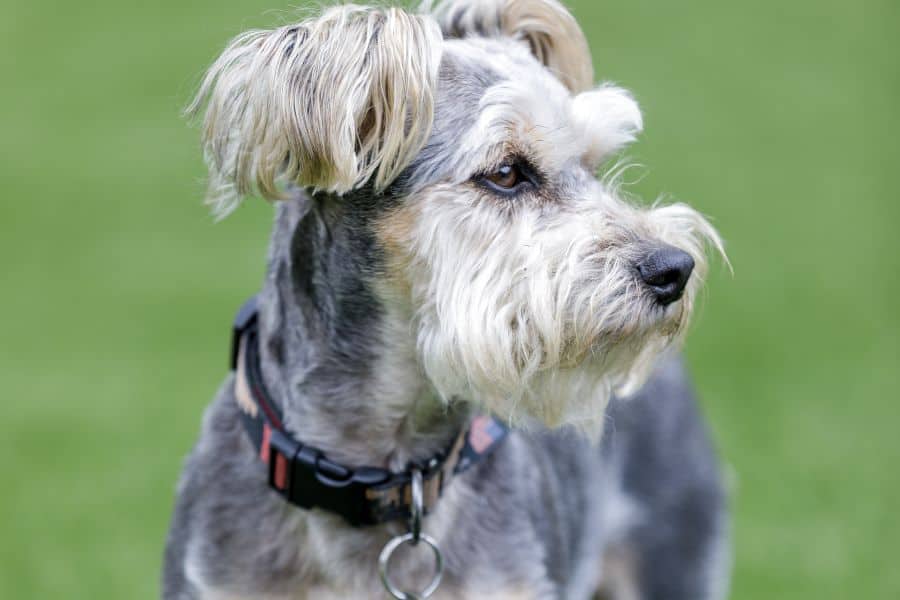
Breeding two different purebred dogs to create a new breed has become increasingly popular in recent years. One of the most sought-after designer breeds is the designer Yorkie or mix. These dogs are created by breeding a Yorkshire Terrier with another purebred dog, such as a Poodle, Chihuahua, or Maltese. While some people may prefer the unique look of designer Yorkies or mixes, it’s important to understand the potential risks and benefits before deciding.
Higher Prices and Ethical Concerns
One of the first things that prospective buyers should be aware of when considering designer Yorkies or mixes is that they can be more expensive than purebred Yorkies. Breeders specializing in creating these unique breeds often charge higher prices due to their rarity and popularity. However, it’s important to research breeders carefully before making a purchase.
Unfortunately, not all breeders are ethical and reputable. Some may engage in unethical practices such as overbreeding, inbreeding, or neglecting their animals’ health needs. To ensure that you’re purchasing from an ethical breeder who prioritizes animal welfare, do your research ahead of time. Look for reviews from previous customers, ask for references from other breeders or veterinarians, and visit the breeder’s facilities in person if possible.
Unpredictable Traits
Another factor to consider when choosing between designer Yorkies or mixes and purebred Yorkies is predictability. Purebred dogs have predictable traits based on their breed standards; for example, Yorkies are known for being intelligent, energetic, and loyal companions. Designer breeds can be more unpredictable because they inherit traits from both parent breeds.
While some people enjoy this unpredictability and appreciate the uniqueness of each individual dog within a litter of designer Yorkies or mixes, others prefer the consistency that comes with owning a purebred dog. If you’re looking for a dog with specific traits, such as hypoallergenic fur or a certain temperament, it may be best to stick with a purebred Yorkie.
Making the Right Choice
Ultimately, the decision between designer Yorkies or mixes and purebred Yorkies comes down to personal preference. Some people prefer the unique look and unpredictable traits of designer breeds, while others appreciate the predictability and consistency of purebred dogs. Whatever your choice may be, make sure to do your research ahead of time and choose an ethical breeder who prioritizes animal welfare above all else.
Mismarked Yorkies: Understanding the Differences
Parti Yorkies: The White and Black, Brown or Tan Marked Pups
Parti Yorkies are a type of mismarked Yorkie with a white coat with black, brown, or tan markings. These pups are often called “parti-colored” because of their unique coloring. Parti Yorkies were once considered a fault in the breed by the AKC, but they have since gained popularity among dog lovers.
One of the reasons why Parti Yorkies are so popular is because of their striking appearance. Their white coats make them stand out from traditional Yorkies, and their markings can vary from pup to pup. Some may have black spots on their backs, while others may have brown or tan markings on their faces.
Despite not being recognized by the AKC, Parti Yorkies can still participate in dog shows and competitions held by other organizations. In fact, there are even some organizations that specialize in showcasing mismarked breeds like Parti Yorkies.
Biewer Yorkies: The Blue and Gold Beauties
Biewer Yorkies are another type of mismarked Yorkie with a white coat with blue and gold markings. These pups were originally bred in Germany in the 1980s by Gertrude Biewer, who was attempting to create a new color variation of the traditional Yorkshire Terrier.
Like Parti Yorkies, Biewer Yorkies were also once considered a fault in the breed by the AKC, but they also gained popularity over time. Their unique coloring makes them stand out from traditional Yorkshire Terriers and has earned them many fans worldwide.
While the AKC does not recognize Biewer Yorkies, they can still participate in shows and competitions held by other organizations, such as the International Biewer Club (IBC), which was founded specifically for this breed.
Chocolate Yorkies: The Sweet Brown Coated Pups
Chocolate Yorkies are a type of mismarked Yorkie with a brown coat instead of the traditional black and tan. These pups are often called “chocolate-colored” because of their unique coloring.
While the AKC may not recognize Chocolate Yorkies, they are still purebred Yorkshire Terriers and can make great pets for those who love their unique coloring. It’s important to note that breeding Chocolate Yorkies can be more difficult than breeding traditional Yorkies because of their recessive gene for brown coloring.
Blue and Gold Yorkies: A Closer Look
Distinctive and rare, blue and gold Yorkies are a unique coloration of the breed that has captured the hearts of many dog lovers. Their silky coat is a sight to behold, gradually transitioning from blue or silver to golden hues. While they may not be recognized as show quality by the AKC due to their non-traditional coloring, these little pups still make great pets and companions.
Grooming Tips for Blue and Gold Yorkies
One of the most distinctive features of blue and gold Yorkies is their silky coat. To maintain its appearance and quality, regular grooming is essential. Here are some tips on how to keep your pup’s coat looking its best:
- Brush your pup’s hair daily with a slicker brush or comb.
- Use a detangling spray before brushing to avoid pulling on knots.
- Bathe your pup once every three weeks using a mild shampoo designed for dogs.
- Dry your pup thoroughly after bathing to prevent matting.
- Trim the hair around your pup’s eyes regularly to prevent irritation.
Potential Health Issues for Blue and Gold Yorkies
As with any pet, it’s important to research potential health issues when considering adding a blue and gold Yorkie to your family. Some common health concerns for this breed include:
- Hypoglycemia: This condition occurs when blood sugar levels drop too low, which can cause seizures or even death in severe cases. Feeding small meals throughout the day can help prevent hypoglycemia in Yorkies.
- Patellar Luxation: This condition occurs when the kneecap slips out of place, causing pain or lameness in affected joints. Regular exercise can help strengthen muscles around the knee joint and reduce the risk of patellar luxation.
- Dental Issues: Small breeds like Yorkies are prone to dental problems such as tooth decay or gum disease. Regular teeth cleaning and dental checkups can help prevent these issues.
Size and Appearance of Blue and Gold Yorkies
Blue and gold Yorkies typically have a smaller size than other colorations of the breed, with an average weight of 4-7 pounds. They have a tan coat with white markings on their chest and feet, which adds to their unique appearance. While they may not be recognized as show quality by the AKC due to their non-traditional coloring, they still make great pets and companions.
Wrapping Up: Final Thoughts on Yorkie Breeds
Yorkshire Terriers, or Yorkies for short, are a beloved breed of small dogs that have captured the hearts of many. From their origins in England to their evolution into various types and colors, we’ve explored the world of Yorkie breeds in depth.
One thing that stands out about these little pups is their personality. Despite their small size, they have big personalities and are known for being spunky, confident, and sometimes even stubborn. This makes them great companions for those who enjoy a lively pet with plenty of energy.
Another aspect worth noting is the diversity within the breed. From Teacup Yorkies to Black Yorkies to Parti Yorkies and beyond, there’s a type of Yorkie for everyone. Each variation has its own unique traits and characteristics that make them stand out from one another.
It’s also important to remember that while designer mixes may be popular among some people, traditional purebred Yorkshire Terriers still hold a special place in the hearts of many dog lovers. Understanding the differences between mismarked or Biewer Terriers can help you decide when choosing your new furry friend.
In conclusion, whether you’re a lifelong fan of Yorkies or just discovering this delightful breed for the first time, there’s no denying their charm and appeal. With their adorable looks and lively personalities, it’s easy to see why they continue to be such popular pets worldwide.
So if you’re considering adding a new four-legged friend to your family, why not adopt a cute little Yorkshire Terrier? They may be small in size, but they’re big on love!
